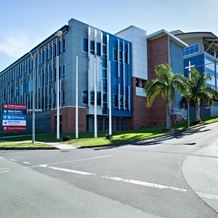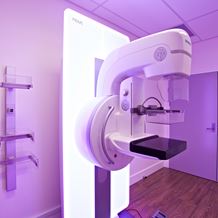Heart Week: Cardiothoracic Surgeons' top 6 prevention tips and patient Tony’s shock diagnosis
St Vincent's Private Hospital Northside
Despite many decades of heart health education, public awareness campaigns and warnings, cardiovascular disease remains the top killer in Australia, claiming the life of one person every 12 minutes.
Medical professionals say it’s a shocking statistic and say National Heart Week is the perfect time to remind everyone that heart health matters and that almost anyone can become a statistic – which can be avoided in many cases.
St Vincent’s Private Hospital Northside is widely recognised as leading the field in advanced cardiac care, combining surgical innovation with extensive knowledge and expertise. From testing and diagnosis, through to treatment and personalised care, clinical excellence is delivered at every stage of the patient’s journey.
Dr Bruce Thomson is a cardiac surgeon operating at St Vincent's Private Hospital Northside. His medical and surgical training focussed on the development of expertise in surgical management of high-risk heart failure patients.
Dr Thomson says the St Vincent’s cardiac surgical and care teams are among the best in the business with its comprehensive and integrated service, including an on-site emergency department, two cardiac catheter laboratories and 17-bed intensive care unit.
Its cardiac ward is staffed by experienced cardiac care nurses, while the cardiac recovery and rehabilitation program is recommended for patients following their discharge - a tailored program of support designed to help patients after a cardiac event, diagnosis or procedure which combines education, exercise-based physiotherapy, and emotional guidance, within an individualised framework.

"St Vincent’s Northside is a large hospital with the full suite of services for cardiac care," says Dr Thompson.
"They have a very experienced team with quick and reliable access to all services which benefits our patients so that they can get cared for and will be passed onto the right team at the right time.
“We’re able to offer the full spectrum of diagnostics and treatment and if patients require surgical intervention, St Vincent’s has a team of specialists and a surgical nursing team which is first class.
“From a surgeon’s perspective, having theatre nurses who are experienced and who know every step of a wide array of cardiac procedures is enormously beneficial – with many nurses, they almost read your mind about what you need to do next and anticipate what equipment you need to be handed.
“It means we can minimise the risk for the patient, whatever the procedure and maximise the return in terms of getting the best possible outcome for each occasion.”
Dr Thomson and his colleague Dr Lachlan Marshall, a cardiothoracic surgeon at St Vincent’s Northside agree that National Heart Week is the ideal time to remind the public about the best things they can do to minimise them having a cardiac event.
Here’s their Top Six Heart Health Tips:
- Don’t smoke or, if you do, quit smoking (this includes vaping)
- Book an annual Heart Health Check with your GP
- Know or enquire about your family’s Heart Health History
- Understand your heart risk and heart age (you can use the Heart Foundation online tool)
- Seek advice or make a plan about how you can improve your diet and exercise activity routine?
- If you have any warning symptoms (especially including chest pain) see a doctor or ring Triple-0
Dr Marshall says just because someone hasn’t had any cardiac symptoms when they hit their 40s and onwards, it doesn’t mean they aren’t at risk of having a cardiac issue. A significant percentage of the population can have an inherited (or hereditary) condition which has been passed on through their parents’ genes, without them being aware of it. (An inherited heart condition is a term covering a wide variety of relatively rare conditions related to the heart.)
"There’s some conditions which don’t manifest with symptoms for many years or even decades for some people,” says Dr Marshall.
"Knowing your family history, including your wider family such as aunts and uncles, is often a good indicator of whether there’s the potential for someone to have a genetic predisposition for a heart condition.
“If people are proactive as well about seeing their GP for an annual Heart Health Check or getting their calcium score tested when appropriate they can potentially pick up underlying issues before they become apparent or before they become serious.
“Sometimes if you wait until you’re having symptoms, then it’s possibly too late and at the first sign of symptoms you need to take action and see a GP or if the pain intensifies significantly or persists, call Triple 0 or get to a hospital.”
Dr Marshall recently spoke further about the importance of understanding your heart health with 4BC Drive's Gary Hardgrave who himself revealed he had experienced his own serious cardiac episode 10 years ago. To listen, click here. The interview starts at 50.30.

Cardiac symptoms can come in many guises and, sometimes it’s not always the classic central chest pain. The pain can masquerade as what appears to be something else, such as back or neck pain or indigestion and reflux. Cardiac specialists say that you should take all chest pain seriously and if you have any unusual, recurrent, sharp or prolonged pain anywhere between the jaw and the belly button in your chest or in your back, you need to consult a doctor.
One of Dr Marshall’s recent patients is Brisbane father Tony Stuart-Street, 65, who had no idea he had ‘bad genes’ which saw him nearly became another typical cardiac statistic recently despite having no background of heart issues, no family history and having stayed fit and active throughout his life.
The days leading into the recent Easter weekend were unremarkable for Tony until he started to feel some unusual pain across his chest twice, which dissipated after 10 minutes on each occasion.
When it happened for a third time, Tony saw a GP (who wasn’t his regular GP). They didn’t believe he was having a cardiac event at that time but told him to monitor his symptoms. When Tony suffered a dizzy spell a few days later while working around his house, his wife immediately took him to the Emergency Department at the nearest major hospital.
After a series of tests, Tony saw Dr Lachlan Marshall who booked him in for a single bypass graft at St Vincent’s Private Hospital Northside the next day.
"I now know that I was having a series of cardiac events over those few days before I saw the doctor, although it didn’t feel too serious as each time the pain passed after a short while,” says Tony.
“But when I saw Dr Marshall and he laid it out for me, and told me I needed urgent surgery, it was a bolt out of the blue and a complete shock to me and the family. Like most people – especially if you feel healthy and if you’ve lived a pretty healthy lifestyle, you never think that you’re a candidate for a heart attack.”
Tony wasn’t overweight, had never smoked, was reasonably vigilant with his diet and had engaged in regular exercise almost his whole life. But the danger lurked hidden and unknown, with Tony having a genetic predisposition to cardiac disease which meant he had one artery which was 90% blocked.

Tony Stuart-Street
Tony had open heart surgery and spent a week post-surgery recovering in St Vincent’s Private Hospital Northside.
While he’s still feeling a bit vulnerable, he was looking forward to getting home and slowly resuming his normal routine over the next few months.
Dr Marshall says Tony was lucky that he acted when he did.
“If he had ignored the shortness of breath, pain and dizzy spells for much longer he probably would have soon had a major heart attack and that would have most likely had a much larger negative impact on his quality of life and his life expectancy,” he says.
- Home
- Patient News
- Heart Week: Cardiothoracic Surgeons' top 6 prevention tips and patient Tony’s shock diagnosis




